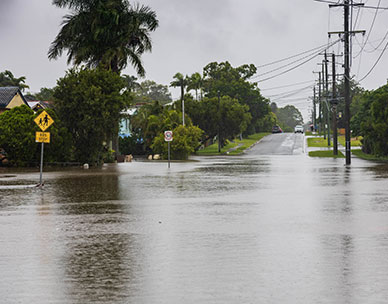Make your emergency plan
Brisbane's subtropical climate makes our city prone to severe weather events and a variety of natural disasters and hazards. You should check your risk, make an emergency plan, pack an emergency kit and stay informed to prepare ahead of potential storms, flood, bushfire or heatwave.
Follow our 4 simple steps to help you be prepared for Brisbane’s severe weather events.
Step 1 - Know your risk
Bushfire
Brisbane’s bushfire season is July to February, however bushfires can occur at any time throughout the year.
Storm
Storms can occur all year long but severe thunderstorms are most likely to occur between December and February.
Heatwave
Extreme heat in Brisbane is most likely to occur between November and March but can occur at any time.
Flood
Brisbane sits on a floodplain which means that flooding is possible at any time. Floods can be caused by creeks, rivers, overland flow or tides.
Talk to your family and friends
- Discuss the risk to your home, pets and family
- Determine how you will respond to a disaster at your home, workplace, school (How would you shelter in place? How would you evacuate?)
- Discuss household roles during each potential emergency
- Create a list of emergency contacts for important people and services you may need to contact (insurers, emergency services)
Prepare your home
- Protect your home by securing any loose items in your yard (furniture, equipment, tools)
- Clean your yard, gutters and downpipes ahead of storm and bushfire seasons
- If flooding is likely, ensure valuables are stored up high
- Prepare your property for bushfire season
- Learn how to turn off water, gas and electricity at main switches
- Collect sandbags ahead of wet weather events
Plan to evacuate
- What is your trigger to leave?
- Who will you tell that you are leaving and how will you tell them?
- Where will you go?
- How will you travel to the safer place?
- Who are you taking with you (including pets)?
Complete your plan
- Complete your emergency plan to capture all information relevant to you and your household - don’t forget to print it to include in your emergency kit!
- Here are a few emergency plan templates that may be relevant to you:
- Bushfire survival plan
- Red Cross Redi Plan (PDF - 543kb) or download the Red Cross Get Prepared app to have your digital emergency plan with you at all times
- Queenslanders with Disability Network’s Person-Centred Emergency Preparedness Workbook (PDF - 1.8Mb)
- Pet emergency plan (Word - 122kb)
Items to include in your kit
- Emergency plan and important documents (passports, drivers licence, wills, USB with important files)
- Portable radio (battery operated recommended)
- Spare batteries and rechargeable mobile battery pack
- Waterproof torch
- First aid kit
- Food utensils and can opener
- Drinking water and non-perishable foods (enough for a minimum of 3 days)
- Toiletry items (toilet paper, toothpaste, toothbrushes and soap)
- Any additional household requirements (medication, baby supplies, pet supplies)
- Sealable waterproof bags
- Tools such as plyers, utility knife and scissors
- Waterproof gloves
Checklist
- Download our extensive emergency kit checklist (Word - 123kb) to complete at your next grocery shop.

Stay connected
Emergency contact information
Emergency contact information
- Life threatening emergencies - 000
- Police/fire/ambulance (mobiles 000 and 112)
- State Emergency Service (SES) - 132 500
- Energex - 13 19 62
- Brisbane City Council - 07 3403 8888
You can also check Council's Facebook page and Twitter feed (@brisbanecityqld) and emergency dashboard for regular updates during an emergency event.
The Queensland Government will also update its alert website during an emergency event.
Check the Queensland Police Service Facebook page and Twitter feed (@qpsmedia) for regular updates.
Tune into your local radio station to listen for weather and warning updates.

